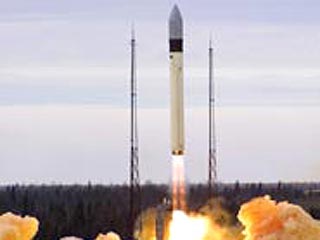Russia apologizes to ESA over the loss of Cryosat space probe
The Russian space industry does not intend to cancel any of its plans in connection with the loss of the European satellite

The Russian space industry is facing another black period in its history: Cryosat, the European satellite that was supposed to map polar ice, was launched from the Plesetsk space port on October 8 with the help of the Rokot carrier rocket, but subsequently fell down in the Arctic Ocean. There is no use to try to retrieve the crashed space probe, nor is there any sense to search for another spacecraft, Demonstrator, which fell down on the Kamchatka Peninsula (Demonstrator was launched with the help of a ballistic missile from Borisoglebsk nuclear submarine). Scientists are not looking for Demonstrator, for the space probe vanished without a trace. However, specialists have reportedly been able to find the whereabouts of the fallen Cryosat satellite. 
The European satellite is not likely to be repaired and launched into space again. A special committee is going to investigate the reasons of the accident, although optimists say that it could have ended with much worse results.
The launch of the Rokot booster rocket from Plesetsk space port started normally. There were no problems with the take off of the rocket, although the connection with the Mission Control Center interrupted only several minutes later. It became known that the second stage of the rocket did not separate on time, the accelerating block did not activate, Rokot failed to reach the Earth's orbit and fell down into the Arctic Ocean.
Roskosmos, the Russian space corporation, has already apologized to its European partners. Demonstrator and Cryosat satellites were made for the European Space Agency and the German company EADS ST. As a result, Roskosmos has suspected the launches of Rokot booster rockets until details of the failed launches become clear.
Is it really a reason to interrupt the work of the space industry? Russia is not the only state in the world, which experiences problems in the field of space exploration: the USA suffers similar difficulties as well.
Mass media distributed the information from Roskosmos's technical control department about the Federal Space Program of Russia as well as international cooperation programs and commercial programs for October-December of the current year. According to the statement, Roskosmos plans to launch seven other booster rockets to launch eleven space probes to the near-Earth orbit. Roskosmos and Space Troops will launch Soyuz, Proton and Rokot carrier rockets from Baikonur and Plesetsk space centers, the press service of Roskosmos said.
The Progress M cargo rocket is to take off from Baikonur on December 21: the rocket is to deliver necessary cargoes to the International Space Station. Three other Proton rockets are slated to take place in December as well. On December 1 Proton M will take into space the US telecommunication Worldsat 3 satellite.
Roskosmos plans to launch the Venus Express interplanetary probe: the European space probe is to take off from the Baikonur center on October 26. The launches of Cryosat and KOMPSAT-2 satellites were slated for October 8 and December 27. The press service of the Russian Space Agency said that the dates of all launches would be specified according to customers' requirements and the technical readiness of launching pads and booster rockets. As it can be seen, the Russian Space Agency has a lot of plans, which do not seem to be canceled in connection with the recent failed mission.
Subscribe to Pravda.Ru Telegram channel, Facebook, RSS!


